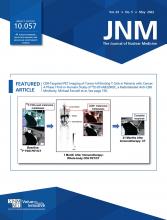The joint American Society of Nuclear Cardiology (ASNC) and SNMMI “80 Hour Radionuclide Authorized User Training Course” was launched on April 12 as a 1-of-a-kind online educational resource for a broad community of radionuclide users. The collaborative project is the result of significant investment of time and energy from subject-matter experts and staff from both professional societies. “This was a more than 2-year cooperative effort directly addressing a genuine need in both the nuclear medicine and nuclear cardiology communities,” said Vasken Dilsizian, MD, who, as the 2019–2020 SNMMI president, initiated planning for the course and, with James A. Case, PhD, oversaw its development. “As someone who is closely involved with education of radiology, nuclear medicine, and nuclear cardiology trainees, I’ve long believed that we’re missing a key element in preparing our workforce on some of the basics in radionuclide knowledge and technique,” said Dr. Dilsizian. “A partnership between 2 of our leading professional societies, leveraging the expertise of their members and the organizational skills of their experienced staffs, has provided an extraordinarily productive environment for creation of this rich and rigorous new resource.”
The course is targeted at nuclear medicine physicians and cardiologists who wish to complete the 80 hours of classroom training required by the U.S. Nuclear Regulatory Commission (NRC) to meet 10 CFR 35.290 training and Agreement State equivalents in basic radionuclide handling techniques for medical use of unsealed byproduct material for imaging and localization studies in order to become Authorized Users (U.S. NRC 10 CFR 35.200). Individuals who complete the course will still need hands-on training in simultaneous clinical work experience in their local nuclear laboratories in the required specified areas as attested to by their Authorized User preceptors. “I am particularly pleased that this course will be available to residents in nuclear medicine and fellows in nuclear cardiology,” said Dr. Dilsizian. “As diagnostic, therapeutic, and theranostic applications of radionuclides grow in number and complexity and as the range of approved radiopharmaceuticals expands, we will need more Authorized Users with a solid understanding of the requisite knowledge and the adaptability to build on that knowledge along with changing technologies and novel discoveries.” In the future, the course may also be useful for nuclear medicine technologists, especially those who intend to take the Nuclear Cardiology Technologist specialty examination. In addition, the course may be useful for other allied health care professionals, such as radiation safety officers and health physicist specialists.
The online course includes 93 modules of video and slide presentations in 5 sections (see Table 1 for content overview). Each module is divided into 2 or 3 chapters, with quiz questions to assess comprehension on chapter content. Participants may go back to review presentation content and reanswer incorrect questions to meet the required passing score. Those who successfully complete the 80 hours of classroom training will receive a certificate of completion from ASNC/SNMMI, which will be recognized by the NRC and Agreement States as part of their Authorized User training requirements.
ASNC/SNMMI Radionuclide Authorized User Training Course: Content Overview
“This would not have been possible without the generous volunteer efforts of the more than 40 course leads and section faculty who participated in multiple planning meetings and devoted substantial time in developing and preparing highly specialized material for this unique effort,” said Dr. Dilsizian. “Kathleen Flood, ASNC CEO, and Virginia Pappas, CAE, SNMMI CEO, deserve special credit for their willingness to bring together their members and staffs to coordinate these efforts. Dawn Edgerton, MA, ASNC Director of Strategic Projects, was an exceptional organizational leader on the project from start to completion.”
The leads for Section 1, Radiation Protection and Safe Radioisotope Handling, are R. Glenn Wells, PhD, and David Wolinsky, MD, with section faculty including Dr. Wells and Brian Abbott, MD; Adam Alessio, PhD; Mouaz Al-Mallah, MD, MSc; Jon Aro, BSc; Stephen A. Bloom, MD; Tyler Bradshaw, MD; James A. Case, PhD; Rami Doukky, MD, MSc, MBA; Dawn Edgerton, MA; Michael King, PhD; Ran Klein, PhD, Elec Eng; Yi-Hwa Liu, MD; April Mann, MBA, CNMT, NCT, RT(N); Frederic J. Mis, PhD, CHP; and William Van Decker, MD.
The second section, on Physics and Instrumentation, is led by Keisha McCall, PhD, and Krishna Patel, MD, MSc, with section faculty including Dr. McCall and Mouaz Al-Mallah, MD, MSc; Ian Armstrong, PhD; James A. Case, PhD; Frederic H. Fahey, DSc; James R. Galt, PhD; Ernest V. Garcia, PhD; Saurabh Malhotra, MD; A. Iain McGhie, MD; Zhihua Qi, PhD; Piotr Slomka, PhD; Brett Sperry, MD; and Stephanie Thorn, PhD.
The third section, on Radiochemistry and Radiopharmaceuticals, is led by Saurabh Malhotra, MD, and Sally Schwarz, RPh, MS, with faculty including Dr. Schwarz and William Crisp, PharmD; Reiko Oyama, RPh, MS; Stephen Moerlein, PharmD; Peggy Squires, BS, CNMT; and William Van Decker, MD.
Section 4, on Radiation Biology, is led by Frederic J. Mis, PhD, CHP, and Ronald G. Schwartz, MD, MS, who serve as section faculty along with Andrew Einstein, MD, PhD.
The fifth section, on Nuclear Medicine Mathematics and Statistics, is led by James A. Case, PhD, and Frederic J. Mis, PhD, CHP, who serve as section faculty along with Maria L. Mackin, CNMT, and Ronald G. Schwartz, MD, MS.
Special recognition is also due to Tina Buehner, PhD, CNMT, for her service on the task force and her contributions to the content of this course. The cost of the course for SNMMI and ASNC members is $400 for cardiology fellows and nuclear medicine residents and $550 for physicians. For nonmembers the cost is $700. To learn more about the course and to enroll, see: https://sites.snmmi.org/SNMMIMAIN/80_Hour_Course/80_Hour_Radionuclide_Authorize_User_Training_Course.aspx or https://www.ASNC.org/80Hour.
American Society of Nuclear Cardiology
SNMMI
- © 2022 by the Society of Nuclear Medicine and Molecular Imaging.







